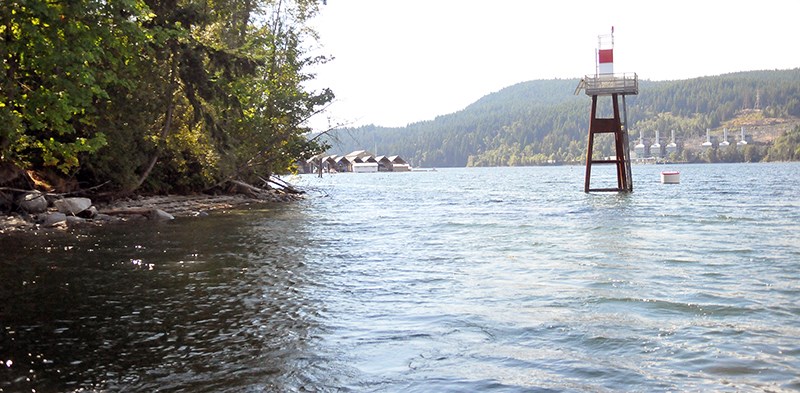When Rod MacVicar describes what lies beneath the water near Reed Point Marina in the Port Moody inlet, he paints a picture of an underwater ecosystem teeming with life.
On a good day, mollusks, gaper clams and schools of cutthroat can be seen in the area, which is also inhabited by a bed of giant pink sea stars that MacVicar said could be some of the largest in the world.
“If you go down during good visibility with divers that are knowledgeable, you see things that are absolutely unique in the world,” said the marine biologist and co-founder of the Mossom Creek Hatchery. “It is a very productive area.”
But the scene MacVicar describes is at odds with the one painted by consultants working for Pacific Coast Terminals (PCT), which recently applied to expand its operations.
The company is currently building a large shed near the sulphur piles and will begin work to enlarge its rail capacity as part of its effort to ship potash through the port.
To mitigate some of the environmental damage caused by widening the rail line, which will expand along the shore on the west side of the property, PCT has offered to build an island east of Reed Point Marina, to be called Reed Island. The company and its consultants said it will enhance the marine habitat in the area by creating an artificial reef and an intertidal zone.
But MacVicar said building the island will mean dumping rocks on top of existing sea life. And he disagrees with the consultant’s assertions that there is no marine life in the area of special concern, noting the giant starfish as just one example he has personally seen.
“Anytime you criticize their consultant, they almost take it personally,” he said. “They are being paid big bucks. I’m a volunteer.”
MacVicar, along with the Burke Mountain Naturalists conservation/education chair, Elaine Golds, spoke out against PCT’s plans during a Port Moody council meeting last month.
Councillors later voted in favour of a motion to send a letter to the company and Port Metro Vancouver expressing concern over the loss of habitat and calling for more “meaningful public consultation” when ecologically sensitive areas are lost.
MacVicar said the island PCT plans to build would destroy more than 50% of the habitat that already exists in the area and would be a major blow to some of the unique species that reside there.
“Their reviews didn’t show any of this,” he said. “Sometimes, you don’t see it if the visibility isn’t good.”
AN IMPROVEMENT
Wade Leslie, vice-president and general manager of Pacific Coast Terminals, said there will be a transition period for the habitat while the island is being built. But he said biologists hired by the company have assured it that, in the long run, the environment will be improved as a result of their work.
“In our opinion, the environmental impact will be a net benefit at the end of the day,” he said. “At the end of the project, we will have a surrounding environment that will be improved.”
The island, he said, has been designed by marine biologists. It will not be accessible to the public, noting that a similar project created in False Creek next to Vancouver’s Olympic Village lost much of its environmental benefits when it became a popular picnic area.
Leslie said the company has been in touch with environmental stakeholders and that he was surprised by some of the opposition he saw to the project at the Port Moody council meeting.
“Rod [MacVicar] and our biologist have a difference of opinion,” he said. “They simply have different sets of opinions. We have done the studies. We have put the cameras down there.”
“We have gone out with our gumboots and got dirty to look at what is out there.”
It is not just the company’s consultants who support the proposal, Leslie added, noting that Environment Canada, Port Metro Vancouver and Fisheries and Oceans Canada have all signed off on the plans.
Despite the approvals, he said he would be open to sitting down with stakeholders once again to go over the project.
“Well, let’s meet and let’s hear your concerns,” he said. “We have had plenty of input during the consulting phase. We are still quite open to meeting with the different stewardship groups in the community.”
PLAN NEEDED
MacVicar said it is likely too late to stop PCT from going ahead with its expansion and the construction of the island. But he said it could be an opportunity for the company to collect data and monitor its mitigation plan to see if it will, in fact, improve the habitat.
“PCT has a record of doing the right thing,” MacVicar said, noting that he understands development and industry are necessary on the waterfront.
But with the expansion of the terminals and questions around the future of the Flavelle sawmill site next to Rocky Point Park, he said it might be time for the city to come up with a strategy for its waterfront.
Decisions need to be made now, MacVicar added, in order to ensure residents continue to have access to the city’s coastline.
“Will it just be industry?” he asks. “There should be an overall plan and an overall philosophy for the shape of the waterfront in Port Moody.”
@gmckennaTC



